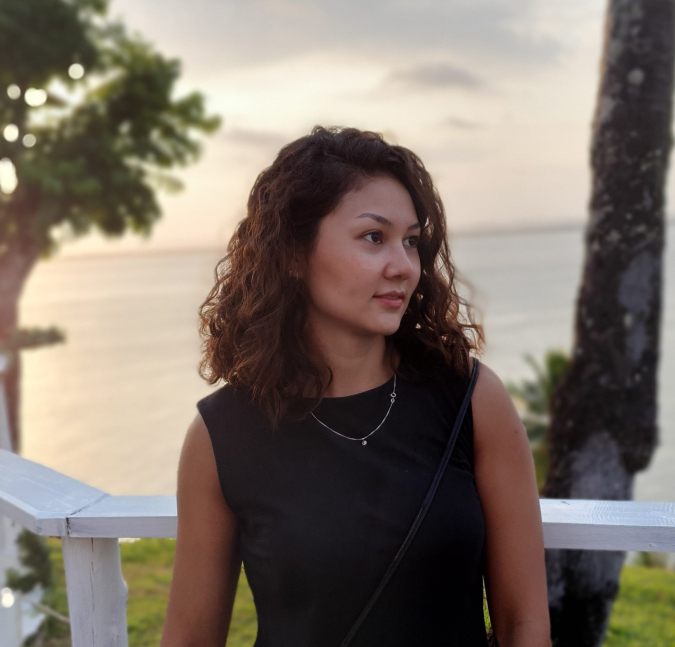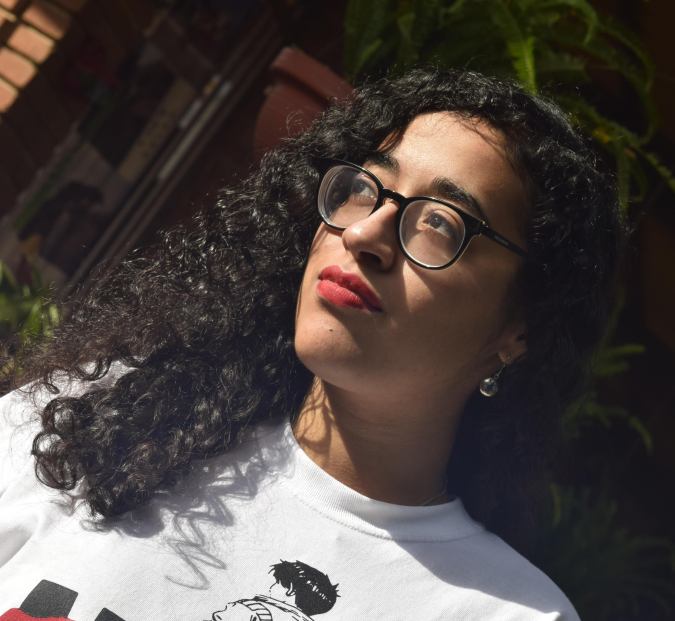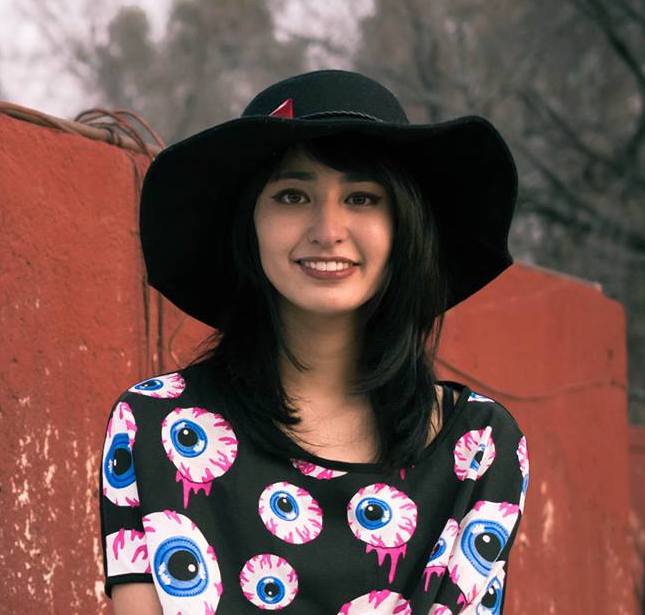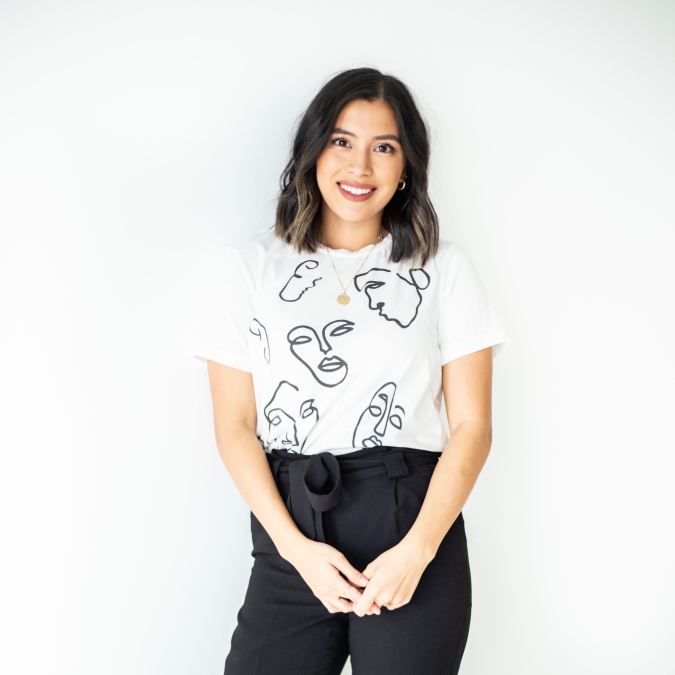Any child of the diaspora will tell you that cultural identity is a sensitive subject. It’s highly personal—something we all grapple and come to terms with throughout our lives. It’s fluid, too. Some facets of your identity are forever. For example, I will always be Mexican and Filipina, born in the U.S. But other pieces can be a bit more malleable. Maybe you embrace new traditions. Perhaps you discover how to make that dish your abuela always used to make. Maybe you unlearn toxic Western standards of beauty. The evolution of your cultural identity is entirely up to you — and that’s part of what makes the journey so exciting. But also, admittedly, a little overwhelming.
For many folks who identify as multicultural, that journey gets even more complicated. As an Asian Latina, I’ve personally struggled with not feeling Asian or Latina “enough,” especially in predominantly Asian and Latine communities. I thought that being one-half Mexican and one-half Filipina suggested some type of shortcoming for much of my life. If I wasn’t “whole” in either community, did I really belong?
According to the U.S. Census Bureau, Caucasians are projected to lose their majority status by 2044, when 50.3 percent of all Americans will be “minorities” (defined by the Census Bureau as non-Hispanic whites). These shifting demographics suggest that multiculturalism is becoming the norm rather than the exception. And with Latines and Asian Americans among the fastest-growing populations in the country, the number of people who identify as both will only increase, too — a reality that we also see on a global scale.
To dig deeper into what it currently means to navigate these respective cultures, I reached out to five Asian Latines in different parts of the world. I asked about the unpacking and maintaining of their cultural identity. Our discussions, at times, turned into informal therapy sessions. We opened up about the struggles that come with representing multiple cultures at once and becoming comfortable in your own skin. It’s an ongoing process that, truth be told, we’re still trying to figure out. Ahead, selected excerpts from our conversations explore the shared experiences among Asian Latines, along with our own unique pathways of trying to fit in, connecting with family, and finding wholeness from within.

These interviews have been edited and condensed for clarity.
Mariana Kobayashi, São Paulo

How do you define your cultural identity?
Brazil is one of the most diverse societies in the world. The immigration, the Black Africans, and the Indigenous peoples have shaped our culture. In this sense, Brazilian national identity merges many ethnic, linguistic, religious, and cultural origins. Since Brazil has one of the largest Japanese communities out of Japan, I personally feel myself belonging and connected to the country where my grandparents decided to migrate from around 70 years ago.

Where did you grow up and how did that affect your cultural identity?
I was born and have lived my entire life in São Paulo, Brazil. Living here has certainly impacted my cultural identity. When my grandparents arrived, they had a hard time adapting to Brazil. The language, eating habits, and way of life caused a strong cultural shock. As much as they were learning more about Western traditions, they passed these customs to my father and his siblings in an attempt to make them more part of the local culture.
Did your family reinforce their traditions and customs?

My father was raised in mixed East-West customs and is married to a Brazilian with a Portuguese background. Nevertheless, they decided to maintain some Eastern traditions in our routine — basic vocabulary, reducing food loss and waste, preparations and appreciation of Japanese cuisine, the hierarchy, and respect.
Did you ever feel like you identified with one culture more than the other?
My parents always encouraged my brothers and me to discover, respect, and understand other cultures. Over time I felt greatly attracted to learn more about Buddhism, yoga, and traditional medicine.
When you think about having a community and a sense of belonging, what comes to mind?
A place where I can believe in whoever I want, people who stand for me when I need and who share the same values. But the most important is a place where I feel respected.
What do you want people to know about being an Asian Latine?
I am enormously proud of my origins and the battle my ascendants had to fight to settle in another continent. Japanese culture teaches us resilience, discipline, organization, and how it is possible to progress even through difficult times. Recently, with the pandemic outbreak, being Asian in America can make you a target of violence, bullying, and other forms of social and political abuse. I want to express my support for the victims and also repudiate these anti-Asian attacks.
Jumko Ogata, Mexico City

How do you define your cultural identity?
I was born in Mexico and my parents are of Afro-Japanese and Indigenous [descent]. But I don’t claim [indigeneity] because culturally, it’s been lost, but mainly Afro-Japanese ancestry. So on paper, people read me as Asian, and then physically, my racialization is Black. Culturally, I have very little Japanese heritage left, but I do try to hang on to it. Lately, I’ve been trying to write down and talk more with my grandmother about her dad, who was Japanese, to preserve this collective memory we have — a community memory of Asianness and Blackness together. And I grew up in the US, so there’s also a bit of that binational, bilingual mix into it as well.
Where did you grow up and how did that affect your cultural identity?
I grew up in the U.S. in a very diverse community where there were people from all over the world. I never thought of myself as particularly strange or an outsider because we all had our particular cultural practices, or our names were unique. It didn’t seem to be a problem. The only thing is, my mom always got comments like, “Is your child adopted?” or, “What is she mixed with?” “Where are you people from?” But once I moved back to Mexico, it became much more apparent that it was a strange thing because Black people are not recognized as Mexicans. Afro-Mexicans as a community barely got constitutional recognition last year. So being Black is not recognized, and just being Asian is not [either]. Being a Black Asian-Mexican is just the double erasure of people not being able to fathom that you are from here.
How did your families reinforce, or not, their traditions and customs?
My great-grandfather, who was Japanese, didn’t pass on many things to his children. The main thing we have in my family is names. We kept the Japanese names. That’s been the main way to connect to our heritage. And finding out what the meanings of the names are, trying to keep them running in the family, even though outsiders would have us change it. We have a couple dishes my great-grandfather used to make. But otherwise, we really have a large disconnect. When I started my undergrad thesis, that was very important to me — to reconnect with that heritage, history, and the community knowledge that was kind of lost.
Did you ever feel like you identified with one culture more than the other?
What has mediated my relation to Japanese culture was trying to connect with the Japanese community in Mexico City. They have a whole association where you can go. It’s quite open, but it’s very racist. That’s also something we really have to address: Asian, or particularly in my case, Japanese racism, imperialism, and colonialism. It’s still very present. For me, racism and colonialism have been a big part of mediating my experience as well because I don’t look Asian. And I’m aware of that. I also try to enunciate my identity within these parameters so as not to appropriate an experience of someone. I have many Japanese-Mexican friends that do look East Asian. I’m aware that I won’t get yelled at because of COVID in the street like they will. That’s also something we have to recognize: the variety of Asian experiences that are here in Mexico and that it’s not a monolithic identity or experience.
When you think about having a community and a sense of belonging, what comes to mind?
With the pandemic, I was able to find a larger community of Asian descended people outside of Asia [online] that has really been a positive experience for me. Like this not feeling Asian enough or not feeling like we are accepted as citizens of the countries we were born and grew up in. I’ve also found a community with a couple of other Black Asian people. I’ve become really good friends with people that are in an Asian collective in Barcelona that’s called Catàrsia. Being able to fully explore our Asian heritage, share our experiences, positive and negative, has been a very valuable experience. Being able to find a group of people where all of our experiences are so diverse, but we still recognize each other in them and we recognize a collective struggle against anti-Asian racism, has been really important.
What do you want people to know about being an Asian Latine?
It’s really important that this becomes another reason to cancel “Latinidad” as a category. Latinidad actually exists to erase all of this diversity, place us under this one homogenous category. Its whole purpose is to bring us toward that aspirational whiteness. [Also], it has never included Black people. It has never included Asian people. White Mestizos appropriate these things and make them universally Latino knowing that’s not the case.
Youko Horiuchi, Mexico City

How do you define your cultural identity?
I have never felt completely Mexican, but I’ve always lived here. I guess I would identify more with Mexican culture. But it’s quite a mixture, because my mom is Mexican and my father is Japanese. It’s really funny to watch them together because they’re just completely different people. I don’t even know how they get along because my mom is always shouting stuff and very energetic. She likes to express everything. She’s very warm. My father is just the opposite. He’s very intellectual, rational. He doesn’t express his feelings much. It’s quite a thing to have these two cultures together. Sometimes I relate more to my father and sometimes I relate more to my mother. The same with the culture: I sometimes relate more with Mexican and sometimes more with Japanese culture.
Where did you grow up and how did that affect your cultural identity?
[Growing up in Mexico City] definitely affected my cultural identity. I got more into Japanese culture because I idealized it. For a long time, I focused a lot on the bad things about Mexico. I didn’t get that much into the good things of Mexico until I started to grow up and started to take a little bit more pride in where I live, because I do love living in Mexico. I actually don’t think I could live that much time in Japan. I always wanted to identify more with Japanese culture. But I noticed that was looking down on my own country and my own culture. And that was generating some internal and personal conflicts [that] I had to deal with. Just recently I’ve been getting more into knowing my own culture. So accepting it is also accepting myself.
How did your families reinforce, or not, their traditions and customs?
My father wasn’t so much into teaching Japanese traditions or anything like that. I know a lot of Japanese dishes, but the weird thing is that my mom was the one who cooked them. My father didn’t cook that much. And my mom was the one who started to get into the culture and to teach it more to us than my father. We also celebrate the New Year in the Japanese way, kind of.
Did you ever feel like you identified with one culture more than the other?
First, I wanted to identify more with Japanese culture, but I noticed I couldn’t because [I’ve grown up] Mexican. So nowadays I don’t identify with one more than the other. It’s just with certain things, I do kind of act more like a Japanese person. But most of the time, I act more like a Mexican. I speak like a Mexican girl. I have lots of Mexican things embedded in my identity. Now, I’m more [of a] balance between the two of them. But that’s something that will change with time, too. Each time I go back to Japan and I come back, I learn something from the other culture.
When you think about having a community and a sense of belonging, what comes to mind?
I do relate a lot with the Nikkei that are half Mexican, half Japanese. I’ve also been with other Latinas that have Japanese parents, and it’s very similar. When I started to meet with other people that had the same two cultures, I noticed we shared similar stuff that made me feel like I did quite belong there. I have friends that live in Japan now. Each time I go out with them there, I feel just at home. It’s weird because I’m not [at] home — I’m in Japan. But being in Japan with Mexican friends, it feels so good. It’s like we can be ourselves in the most weird way because we can talk Spanish in Japan and go and act like Mexicans with so much energy. We like to party a lot.
What do you want people to know about being an Asian Latino?
I always think people have to be empathetic with the way that people are and why they are the way they are. That has a lot to do with how they were raised and their cultures. I feel really blessed having these two cultures because it gives you lots of perspective. [It] also gives you this sense of having to construct your own identity from these two things. We all have to deal with our identity. But having these two differences makes you a little bit more conscious about the things that affect you and how they affect you.
Gabe Bergado, New York City
How do you define your cultural identity?
A major revelation I’ve had in the past year — especially with multiracial people — we’re taught this rhetoric of saying, “I’m half Mexican, half Filipino.” I’ve really been very purposeful with taking that half terminology out of my speech when I’m talking about my identity, I see it much more fluid now. I’m Filipino and Mexican. I’m not two halves of one equal. I have these two different backgrounds that also intersect with many other aspects of my life that create this full picture of who I am as a person.
Where did you grow up and how did that affect your cultural identity?
I’m from La Palma, California, which is a small suburb. It’s not luxurious, even though it has a fun name. There is a huge presence of a lot of different Asian cultures. When it comes to Latinos, it’s definitely Mexicans, but I was very fortunate to have a huge diversity of people where I’m from. Then my high school itself — it was very, very Asian. I had really close friends who were Filipino, but also Vietnamese, Chinese, Korean. Growing up there, I never really thought too much about race back then. I’m just very thankful to have grown up in a place where I was able to go get boba after school and also taquitos.
How did your families reinforce, or not, their traditions and customs?
Thankfully, both sides love food. That was always a really fun way to come together. When I do stand-up, I have this funny bit about menudo, how there’s menudos in both Mexican and Filipino cultures and they’re different. I found out that tripe was something I was like, “Oh, it’s cool. They’re making use of the whole cow.” But when I saw cabeza on a taco menu once, that kind of freaked me out a bit. I’m trying to decolonize my perception of what I can eat of an animal or not. Menudo was always a big deal. There was always beans on the stove — like you showed up to grandma’s and there’s always beans there. Also, as Filipinos, we love karaoke.
Did you ever feel like you identified with one culture more than the other?
I don’t think so explicitly. I think in certain spaces. But I don’t think there was ever a part of my life where I felt like I identified more.
When you think about having a community and a sense of belonging, what comes to mind?
I need to be better about telling myself I don’t fit into spaces because I’m not enough of one thing, [and] be more thankful for the fact that I can fit into so many spaces because I identify as many things. That’s something I wanted to embrace more, especially when I was an editor at Teen Vogue. I was able to bring my awareness to both Latinx issues and also Asian-American issues and also queer issues. I’m proud to be able to have my hand in so many different places, and especially at a place where I was helping steer coverage. It was exciting to get to do that.
What do you want people to know about being an Asian Latine?
That we exist. And also just as any other identity [or] community, we’re not a monolith. There’s so many varied experiences. Maybe just having more understanding of culturally, why a lot of Latinos and Asians have come together for community-based reasons. It’s been really great reading about the labor movement in California and how Mexicans and Filipinos worked together a lot. We have our own rich history of movements as well, but again, we’re not a monolith.
Lisa Murtaugh, Atlanta

How do you define your cultural identity?
As of recently, I identify as a Vietnamese Mexican Southern American. I know it’s a bit of a mouthful, but I own it. I’m first-generation American. My parents met in the chicken capital of the world in North Georgia. That was where I was born and raised.
Where did you grow up and how did that affect your cultural identity?
[Growing up in rural Georgia], for the longest time, I was mostly confused. I felt like I lived this double life where I went to school, and I was this person just trying to fit in with people who honestly would never be able to relate to what I was going through. Then I came home to this amalgam of cultures, languages, food, and trauma, too. I’ve always been proud of being Mexican and Vietnamese. But for most of my life, I felt like I couldn’t be an Asian, Latina, and also own my Southern American upbringing. Most of the time, I was very confused. Then in my 20s, I evolved and started owning where I came from.
How did your families reinforce, or not, their traditions and customs?
Food was everything. That has impacted and connected me the most to my roots. My dad always had Vietnamese food ready for dinner. My mom would cook Mexican food on her days off. I also think that’s why I’m so desperate to perfect my Vietnamese and Mexican recipes or cooking because I have this fear of it all ending with me. I’m also the product of parents that want to do everything on their own. They’re very anti giving me any sort of recipe. They’re like, “If you want some home cooking, you come here and you get it.” So I’ve been on YouTube a lot trying to figure out recipes. I’m like, “I’m gonna get this to taste exactly [like] what you did, whether you like it or not.”
Did you ever feel like you identified with one culture more than the other?
Yeah, for sure. It changed, though, throughout my life. My Spanish is so much stronger than my Vietnamese. The ability to speak Spanish really allowed me to communicate and create relationships with my Mexican side of the family. I remember we would do road trips to Mexico some summers. I latched on to all my experiences there. Because those moments are when I really felt seen because I knew the language and I just felt at home. But then in high school, being an angsty teen, I remember wanting to have the same freedoms as my white friends. My parents were really strict. When it came to sleepovers and stuff, forget about it. But I remember one day, I was begging my parents to let me go this one weekend. And my dad, he said something along the lines of, “Oh, you just want the American way.” At the time, I didn’t know how to properly process that. But now, I turned 30 [recently and] thinking about it, I’m like, “Well am I not American? Did you not come over here in hopes of the American way?” So it goes back to identifying as an Asian Latina, but also needing the permission or the validation to also own and identify as being Southern American as well, right? Can I have both?
When you think about having a community and a sense of belonging, what comes to mind?
When I think of community, it always revolves around food, music, beers, and a space for conversation. But it’s also a space of being around people that are welcoming and make you feel like you’re part of something. In a nutshell, that’s what I feel community should be.
What do you want people to know about being an Asian Latine?
I’m not gonna lie: I feel like being an Asian Latina can be really tough and confusing and very lonely to navigate, especially if you’re also an American. But I think it’s all worth it because there’s so much power in being Asian Latina. There’s so much beauty. There’s so much damn good food. Honestly, it’s like the best thing ever. I wouldn’t trade it for the world. You realize that as you get older and you build your community. You build your life that you want to have and you’re able to appreciate it more.




